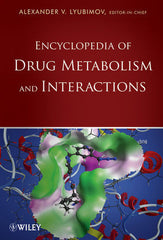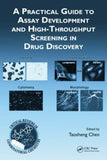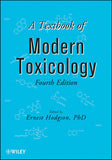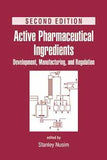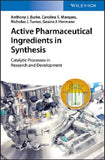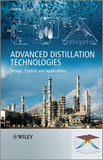Encyclopedia of Drug Metabolism and Interactions, 6-Volume Set
Encyclopedia of Drug Metabolism and Interactions, 6-Volume SetAlexander V. Lyubimov (Editor)
4784 pages
October 2012
|
"This one-stop reference brings together information scattered throughout the literature, and it involved the efforts of 270 expert authors from 16 countries — a global endeavor accomplished under the leadership of editor Alexander Lyubimov." –Book News Inc., February 2013
The Encyclopedia of Drug Metabolism and Interactions provides essential support during all phases of drug development, from drug design to drug action and interaction in patients.
This multivolume work covers both preclinical and clinical aspects of drug metabolism and interactions. It also provides a wealth of toxicological, regulatory, and marketing information, all written by leading international experts in the field. Using this reference you'll discover:
• Enzymes that can be inhibited or induced and their impact on drug toxicity and altered response in both animal and human models
• Effect of genetic differences and non-genetic factors on drug metabolism
• Balance among drug metabolism, its inactivation/activation, and its potential toxicity
• Examples demonstrating all aspects of drug metabolism and interactions in silico, in laboratory animals, and in humans
• Methods and detailed protocols enabling you to perform seamless studies of metabolism and drug interactions
This reference is essential for researchers interested in all aspects of drug development, and chemists, pharmacologists, pharmaceutical specialists, toxicologists, molecular toxicologists, and clinicians, including practitioners and physicians.
VOLUME I
Part 1: Basics Overview of Drug Metabolism
Chapter 1 Review of Drug Metabolism in Drug Discovery and Development
Chapter 2 Reactions and Models of Drug Metabolism
Chapter 3 Enzyme kinetics of drug metabolism reactions and drug-drug interactions
Chapter 4 Developmental changes in drug metabolizing enzymes
Chapter 5 Species differences in drug metabolizing enzymes
Part II: Enzyme systems involved in drug metabolism and interactions in animals and humans
Chapter 6 Structure and function of cytochrome P450 enzymes
Chapter 7 Mechanism of cytochrome P450 mediated reactions
Chapter 8 Transcriptional regulation of cytochrome P450 enzymes
Chapter 9 Cytochrome P450 polymorphisms
Chapter 10 Flavin monooxygenase
Chapter 11 Molybdenum containing enzymes
Chapter 12 Amine odidases and reductases
Chapter 13 Epoxide hydrolase
Chapter 14 Esterases and amidases
Chapter 15 UDP- glucuronosyltransferases
Chapter 16 Sulfotransferases
Chapter 17 Glutathione S- transferases
Chapter 18 Amino acid conjugation
VOLUME II
Part III: General principals of ADME. Drug transporters and other mechanisms of transport
Chapter 1 Introduction to ADME. Overview
Chapter 2 Anatomical and Physiological Parameters that Influence Gastrointestinal Absorption
Chapter 3 Absorption of drugs into the body
Chapter 4 General principles of drug distribution
Chapter 5 ABC drug transporters and their impact on drug disposition/drug sensitivity and resistance
Chapter 6 SLC family transporters
Chapter 7 General principles of drug metabolism
Chapter 8 Systems where drug metabolism occurs
Chapter 9 Mass balance studies in animals and humans
Chapter 10 Bioavailability and bioequivalence
Chapter 11 Allometric scaling
Chapter 12 Effect of protein binding in ADME
Chapter 13 Excretion systems
Chapter 14 Pharmacokinetics (PK) and toxicokinetics (TK)
Chapter 15 Experimental design/mathematical models and data analysis/interpretation for PK /TK studies
Chapter 16 Physiologically-Based Pharmacokinetic Modeling
Chapter 17 Pharmacodynamics
Chapter 18 Interrelationships between Pharmacokinetics / Pharmacodynamics and metabolism
Part IV: ADME of some specific groups of drugs and delivery systems
Chapter 19 ADME of herbal and dietary constituents
Chapter 20 ADME of anticancer drugs
Chapter 21 ADME of cardiovascular drugs
Chapter 22 ADME of biological drugs
Chapter 23 ADME of natural toxins
Chapter 24 Metabolism and drug-drug interactions in pregnant mother/placenta/fetus
VOLUME III
Part V: Drug Design and development
Chapter 1 Where and when does drug metabolism enter as a concern?
Chapter 2 Challenges in frontloading toxicity testing of anti- cancer drugs in drug discovery
Chapter 3 Role of ADME for selection of new drug candidates
Chapter 4 Efficient drug development. How to speed up the development process
Chapter 5 Metabolite profiling and identification
Chapter 6 Bioactivation and oxidative stress
Chapter 7 Metabolism in drug safety evaluation
Part VI: Methods and protocols for prediction and evaluation of drug metabolism and drug interaction studies
Chapter 8 In silico models of drug metabolism and drug interactions
Chapter 9 Methods for determination of enzyme kinetics and metabolic rates
Chapter 10 Assays and microarrays for metabolic pathways
Chapter 11 Applications using Caco-2 cells and TC7 cells for drug metabolism studies
Chapter 12 In vitro liver systems to study induction/inhibition. Prediction of in vivo metabolism and drug-drug interactions
Chapter 13 Assessing the Hepatic Disposition and Toxicity of Xenobiotics Using Primary Hepatocytes
Chapter 14 Monoclonal Antibody Based Analyses of Human Drug Metabolism and Multifuctional Cytochromes P450
Chapter 15 Validation of precision- cut slices as a tool to study induction of drug metabolism
Chapter 16 Practical aspects of high throughput solubility and dissolution assessment in preformulation
Chapter 17 Integrated Approaches to Blood Brain Barrier and its role for drug metabolism and interactions
Chapter 18 In vivo models (not genetically modified)
Chapter 19 Using mouse knockout and transgenic models to study metabolism
VOLUME IV
Part VII: Pharmacology and toxicology
Chapter 1 Introduction. Overview. Role of metabolism in drug toxicity
Chapter 2 Bioactivation I: Phase I (P450)
Chapter 3 Bioactivation II: Phase I (non P450)
Chapter 4 Bioactivation III: Phase II
Chapter 5 Covalent Binding
Chapter 6 MIST
Chapter 7 Cell- based predictors for Toxicities of Metabolites
Chapter 8 Toxicogenomics
Chapter 9 Metabonomics
Chapter 10 Proteomics
Chapter 11 Stereoselectivity in drug metabolism
PART VIII: Influence of physiological conditions, diseases, drug- food interactions, age, sex, and other factors on drug metabolism and effect
Chapter 12 Genetic influence on metabolism
Chapter 13 Drug- Drug interactions 1: Inhibition
Chapter 14 Drug- Drug Interactions 2: Induction
Chapter 15 Ontogeny and Metabolism
Chapter 16 Natural Modulators of Human Drug Metabolism: Dietary supplements and their Clinical Relevance (Food Effects on Toxicity and Pharmacology)
Chapter 17 Idiosyncratic drug interactions
Chapter 18 Influence of inflammatory stress on drug (or xenobiotic) hepatotoxicity
Chapter 19 Regulation of Drug-Metabolizingnzymes and Transporters in Infection, Inflammation, and Cancer
VOLUME V
Part IX: Bioanalytical methods of studying metabolism
Chapter 1 Introduction. Importance of in vivo/in vitro analytical results in drug development Walter
Chapter 2 General principles of mass spectrometry: LC-MS, LC-MS/MS, and GC-MS
Chapter 3 Electrospray and Infusion nanospray ionization
Chapter 4 Emerging Atmospheric pressure ionization
Chapter 5 Matrix assisted laser desorption ionization (MALDI)
Chapter 6 Ion trap and quadrupole MS
Chapter 7 Hybrid LTQ- FTMS for Drug Metabolism Applications
Chapter 8 Mass Spectrometry Imaging (MSI)
Chapter 9 Ion Mobility Spectrometry and High Performance Tandem MS for metabolism studies and identification
Chapter 10 Inductively coupled plasma mass spectrometry (ICP MS) for element- containing drug metabolism analysis
Chapter 11 Online Electrochemical LC- MS Techniques for Profiling
Chapter 12 NMR
Chapter 13 Whole body autography and radioactive and non- radioactive isotope assays
Chapter 14 Ligand binding assays (immunoassays)
Chapter 16 Direct plasma analysis systems
Chapter 17 Analytical method development and validation in accordance to the regulatory guidelines
Chapter 18 Leveraging advances in HPLC to maximize DMPK data quality
Chapter 19 Methodologies to Increase Analytical Throughput
Chapter 20 Biomarkers to enable PK/PD
Chapter 21 Bioanalytics for Human Microdosing
Chapter 22 Bioactivation and Reactive Metabolite Assays
Chapter 23 Plasma protein binding
VOLUME VI
Part X: Clinical aspects of drug metabolism and interactions
Chapter 1 Overview and introduction. Role of drug metabolism and drug interactions in humans
Chapter 2 Human cytochrome P450 enzymes
Chapter 3 DDI Risk Assessment and Evaluation in Clinical Development: Interfacing Drug Metabolism and Clinical Pharmacology
Chapter 4 Current and future tools for predicting clinical drug interactions
Chapter 5 Predicting human biotransformation pathways
Chapter 6 Conjugation, transport, and elimination of drugs in humans
Chapter 7 Role and clinical consequences of human UDP- Glucuronosyltransferases
Chapter 8 Drug/food and drug/herb interactions
Chapter 9 Effects of disease on metabolism of drugs in humans
Chapter 10 Role of Phase I metabolism in drug activation and clinical treatment outcomes
Chapter 11 Role of metabolism in toxicity of drugs in humans
Chapter 12 Idiosyncratic drug reactions and the potential role of metabolism
Part XI Metabolism of specific drug groups and patient populations
Chapter 13 Metabolism of psychotropic drugs
Chapter 14 Metabolic-based consequences of polytherapy with AED
Chapter 15 Oral chemotherapeutic agents: Understanding mechanisms of action and drug interactions
Chapter 16 Drug metabolism and interactions in pediatric patients
Chapter 17 Population- based pharmacokinetic modeling and simulation
Chapter 18 Clinical Pharmacology in drug labeling. The impact of drug metabolism and clinical pharmacology on recommended dose of drugs
Related Products
-
A Practical Guide to Assay Devel...
13,464.00
16,830.00 -
A Textbook of Modern Toxicology,...
8,942.00
10,520.00 -
Active Pharmaceutical Ingredient...
3,200.00
3,495.00 -
Active Pharmaceutical Ingredient...
14,850.00
17,500.00 -
Advanced Distillation Technologi...
13,500.00
15,000.00 -
Aesthetics Exposed: Mastering Sk...
17,000.00
- Architecture & Construction Management Books
- Biochemistry, Bioengineering and Biotechnology Books
- Books on Analytical Techniques, GC MS, LC, TLC, HPLC, NMR Spectroscopy
- Books on Water and Wastewater Treatment, Analysis Water Treatment Plants
- Chemical Technology, Organic Chemistry, Chemical Synthesis and Chemical Analysis Books
- Cosmetics Science, Cosmetics Formulations, Manufacture and their Analysis Books
- Drugs and Pharma Science Books
- Essential Oils, their Analysis, Natural Products Extraction, Distillation , Isolates Related Books
- Flavor Science, Flavor Analysis, Flavor Creation, Food Flavors Books
- Food Science and Technology, Baking , Food Ingredients , Food Quality , Food Regulations
- Formulations of Perfumes for Agarbatti, Air Freshners, Soaps & Detergents, Fabric Softeners , French style Perfumes, Attars , OUD, Fine Fragrances
- Fragrances, Scents, Attars , Perfumery and Aroma Chemicals Books
- Herbal, Ayurvedic, Medicinal Plants and Aromatic Plants Books
- Law Books
- Major Reference Works (MRWS) Sets - MultiVolume Sets
- Medical Books
- Medical Journals Wolters Kluwer | Medknow India
- NEW ARRIVALS
- Perfumer's Resources
- Special Indian Reprint !



